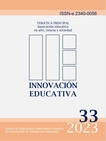Verification on of the internal structure of a questionnaire to study of disability in higher education (CEDES)
Main Article Content
Abstract
The presence of students with disabilities in university classrooms is increasingly frequent, which implies an effort for universities to address changes in their daily tasks. In the present work, the validation of an instrument designed to find out the opinion of university students on the inclusion of students with disabilities in disability, the Questionnaire for the Study of Disability in Higher Education (CEDES), was carried out. We worked with a non-probabilistic sample of an intentional nature of 1,934 undergraduate students, and the reliability calculation and an exploratory factor analysis (EFA) of the questionnaire under study were performed. The results obtained show that the instrument is reliable and that its factorial structure is made up of 5 factors (institutional framework, accessibility, information and orientation, access and participation). Based on the results obtained, it is concluded that the questionnaire is a useful tool to describe the opinion of students about attention to disabilities in the university institution.
Keywords:
Article Details
References
Bowles, T.V. y Brindle, K. A. (2017). Identifying facilitating factors and barriers to improving student retention rates in tertiary teaching courses: a systematic review. Higher Education Research & Development, 36(5), 903-919. https://doi.org/10.1080/07294360.2016.1264927
CERMI (Comité Español de Representantes de Personas con discapacidad) (2019). Resumen de la posición del movimiento CERMI en materia de educación inclusiva. https://tinyurl.com/yy3gq72p
CIF. Organización Mundial de la Salud (2001). Clasificación Internacional del Funcionamiento, de la Discapacidad y de la Salud. Ministerio de Trabajo y Asuntos Sociales. Secretaría General de Asuntos Sociales. Instituto de Migraciones y Servicios Sociales.
Días, P. C., Bastos, A. S., Gandra, M. y Díaz-Pérez, J. (2013). GENIUS, ¿plagio o creatividad? Aportes para una discusión sobre las prácticas pedagógicas. Bordón, 65(3), 9-23. https://doi.org/10.13042/23154
Espiñeira-Bellón, E. M., Mosteiro-García, M. J., Muñoz-Cantero, J. M. y Porto-Castro, A. M. (2019). Cuestionario para la detección del plagio académico en estudiantes de doctorado (CUDECO-DOU). Revista de Estudios e Investigación en Psicología y Educación, 6(2), 156-166. https://doi.org/10.17979/reipe.2019.6.2.5794
Ferreira, C., Vieira, M. J. y Vidal, J. (2014). Sistema de indicadores sobre el apoyo a los estudiantes con discapacidad en las universidades españolas. Revista de Educación, 363, 412-444. https://doi.org/10.4438/1988-592X-RE-2012-363-193
Fundación Universia (2021). Universidad y Discapacidad. V Estudio sobre el grado de inclusión del sistema universitario español respecto de la realidad de la discapacidad. Fundación Universia.
Garabal-Barbeira, J., Pousada, T., Espinosa, P. y Saleta Canosa, J. L. (2018). Las actitudes como factor clave en la inclusión universitaria. Revista Española de Discapacidad, 6(1), 181-198. https://ruc.udc.es/dspace/handle/2183/21602
Gerpe, E. M. (2020). El alumnado con discapacidad en el contexto de la educación superior: el caso del sistema universitario de Galicia [tesis doctoral, Universidade de Santiago de Compostela]. Minerva, Repositorio Institucional da USC. http://hdl.handle.net/10347/24530
González-Gil, F., Martín, E., Flores, N., Jenaro, C., Poy, R. y Gómez-Vela, M. (2013). Inclusion and School Coexistence: Analysis of Teachers Training. European Journal of Investigation in Health, Psychology and Education, 3(2), 125-135. https://doi.org/10.3390/ejihpe3020011
Lorenzo Lledó, G., Lorenzo Lledó, A. y Lledó Carreres, A. (2020). Las percepciones sobre la discapacidad de los estudiantes del Grado de Maestro. Revista de Educación Inclusiva, 13(1), 162-179. https://revistaeducacioninclusiva.es/index.php/REI/article/view/481
Márquez, C. y Sandoval, M. (2019). Claves para hacer realidad la educación inclusiva en las Universidades. En C. Márquez (Ed.) ¿Avanzamos hacia universidades más inclusivas? De la retórica a los hechos (pp. 45-60). Dykinson. https://doi.org/10.2307/j.ctvr7f5rq.6
Martins, M. H., Borges, M. L. y Gonçalves, T. (2018). Attitudes towards inclusion in higher education in a Portuguese university. International Journal of Inclusive Education, 22(5), 527-542. https://doi.org/10.1080/13603116.2017.1377299
Moriña, A. (2017). Inclusive education in higher education: Challenges and opportunities. European Journal of Special Needs Education, 32(1), 3-17 https://doi.org/10.1080/08856257.2016.1254964.
ONU (2015). Agenda 2030 para el Desarrollo Sostenible de las Naciones Unidas. ONU.
Perera, V. H., Molero, N. y Moriña, A. (2022). Prácticas docentes para una educación inclusive en la Universidad con estudiantes con discapacidad: Percepciones del Profesorado. Revista Mexicana de investigación educativa, 27(93), 433-454. https://www.scielo.org.mx/scielo.php?pid=S1405-66662022000200433&script=sci_arttext
Rodríguez-Martín, A. y Álvarez-Arregui, E. (2015). Universidad y Discapacidad: actitudes del profesorado y estudiantes. Perfiles Educativos, 37(147), 86-102. https://doi.org/10.22201/iisue.24486167e.2015.147.47265
Sandoval, M., Simón, C. y Márquez, C. (2019). ¿Aulas inclusivas o excluyentes?: barreras para el aprendizaje y la participación en contextos universitarios. Revista Complutense de Educación, 30(1), 261-276. https://doi.org/10.5209/RCED.57266
Welch, S. y Comer, J. (1998). Quantitative methods for public administration: Techniques and applications. Universidad de Virginia: Brooks/Cole.
Zamora, S., Monroy, L. y Chávez, C. (2009). Análisis Factorial: una técnica para valorar la dimensionalidad de la pruebas. Cuaderno Técnico nº 6. Centro Nacional de Evaluación para la Educación Superior (México).
Most read articles by the same author(s)
- Enelina María Gerpe Pérez, Luis Fernando Pérez Méndez, Current panoramic of integrated public schools of compulsory teaching in the Autonomous Community of Galicia , Innovación educativa: No 28 (2018): In the centenary of the Institute-School creation: past, present and future of the integrated public schools of compulsory primary and secondary education







